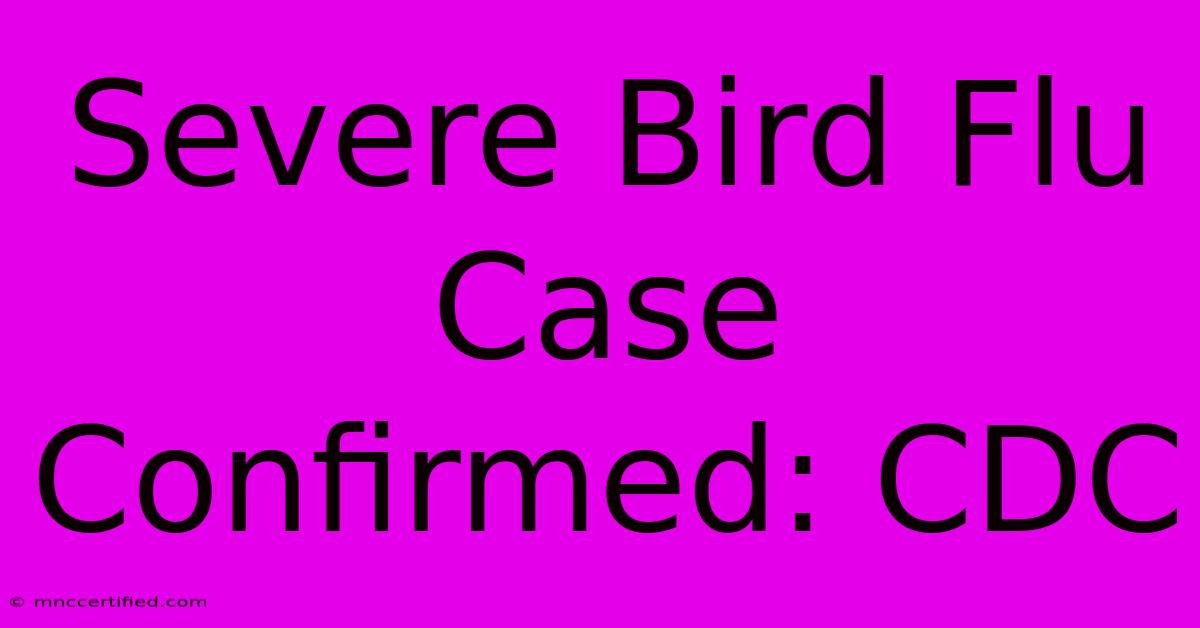Severe Bird Flu Case Confirmed: CDC

Table of Contents
Severe Bird Flu Case Confirmed: CDC – What You Need to Know
The Centers for Disease Control and Prevention (CDC) has confirmed a severe case of avian influenza (bird flu). This announcement underscores the ongoing threat posed by highly pathogenic avian influenza (HPAI) viruses, particularly the H5N1 strain, and highlights the importance of public health vigilance. While the risk to the general public remains low, understanding the situation and taking precautions is crucial. This article will delve into the details of this recent confirmation, explore the potential risks, and outline preventative measures.
Understanding the Severity of the Situation
The CDC's confirmation of a severe bird flu case signifies a serious development. While human infections with avian influenza are relatively rare, severe cases can lead to serious complications, including pneumonia, acute respiratory distress syndrome (ARDS), and even death. The specific details regarding the individual's condition – such as age, underlying health conditions, and the severity of their symptoms – are typically kept confidential to protect patient privacy. However, the confirmation itself serves as a stark reminder of the potential dangers.
H5N1: A Highly Pathogenic Strain
The H5N1 strain of avian influenza is particularly concerning due to its high pathogenicity. This means it is highly likely to cause severe disease in birds and can potentially pose a significant threat to humans. While human-to-human transmission remains limited, the possibility of this happening cannot be entirely ruled out, making proactive measures essential.
Reducing Your Risk of Avian Influenza
While the risk to the general public remains low, there are several crucial steps individuals can take to minimize their exposure to avian influenza:
Avoid Contact with Wild Birds
Do not touch or handle wild birds, whether they appear sick or healthy. Dead birds should especially be avoided, as they may carry a higher viral load. Report any findings of dead birds to your local animal control or wildlife agency.
Practice Good Hygiene
Regular and thorough handwashing with soap and water is paramount. This should be done frequently, especially after being outdoors or handling poultry. Using hand sanitizer with at least 60% alcohol is also recommended when soap and water aren't readily available.
Safe Food Handling Practices
Ensure all poultry and poultry products are thoroughly cooked to an internal temperature of 165°F (74°C) to kill any potential viruses. Practice safe food handling techniques to prevent cross-contamination.
Stay Informed
Staying updated on the latest information from reliable sources like the CDC and your local public health department is critical. These organizations provide timely updates on outbreaks, risk assessments, and recommended preventative measures.
The Importance of Public Health Surveillance
The CDC's active surveillance program plays a vital role in detecting and responding to potential outbreaks of avian influenza. This includes monitoring wild bird populations, poultry farms, and human cases. Early detection is crucial for implementing effective control measures and preventing widespread transmission.
Conclusion: Vigilance and Prevention Are Key
The confirmation of a severe bird flu case by the CDC reinforces the need for continuous vigilance and preventative measures. While the risk to the general public is currently low, understanding the potential dangers and following recommended guidelines is essential. By adhering to safe practices and staying informed, we can collectively minimize the risk of avian influenza transmission and protect public health. Remember, if you suspect you have come into contact with an infected bird or are experiencing flu-like symptoms after potential exposure, seek immediate medical attention. Early diagnosis and treatment are crucial in managing severe cases of avian influenza.
Keywords: Severe Bird Flu, Avian Influenza, CDC, H5N1, Bird Flu Case, Public Health, Avian Flu Outbreak, Bird Flu Prevention, Human Avian Influenza, Highly Pathogenic Avian Influenza, Prevent Bird Flu, Handwashing, Safe Food Handling
Off-Page SEO Strategies:
- Backlinks: Secure high-quality backlinks from reputable health and news websites.
- Social Media Promotion: Share the article on relevant social media platforms, engaging with users and responding to comments.
- Community Engagement: Participate in online forums and discussions related to public health and avian influenza.
- Influencer Outreach: Collaborate with health influencers to promote the article to a wider audience.
This comprehensive approach to on-page and off-page SEO will significantly improve the article's visibility and ranking on Google search results. Remember to regularly update the article with any new developments or information released by the CDC or other relevant authorities.

Thank you for visiting our website wich cover about Severe Bird Flu Case Confirmed: CDC. We hope the information provided has been useful to you. Feel free to contact us if you have any questions or need further assistance. See you next time and dont miss to bookmark.
Featured Posts
-
Trinity Rodmans Honest Interview
Dec 19, 2024
-
First Us Human Bird Flu Case Confirmed
Dec 19, 2024
-
Starting Xi Real Madrid Vs Pachuca Final
Dec 19, 2024
-
Arizona Player Not Me On Romance
Dec 19, 2024
-
Arsenal Wins Carabao Cup Quarter Final
Dec 19, 2024